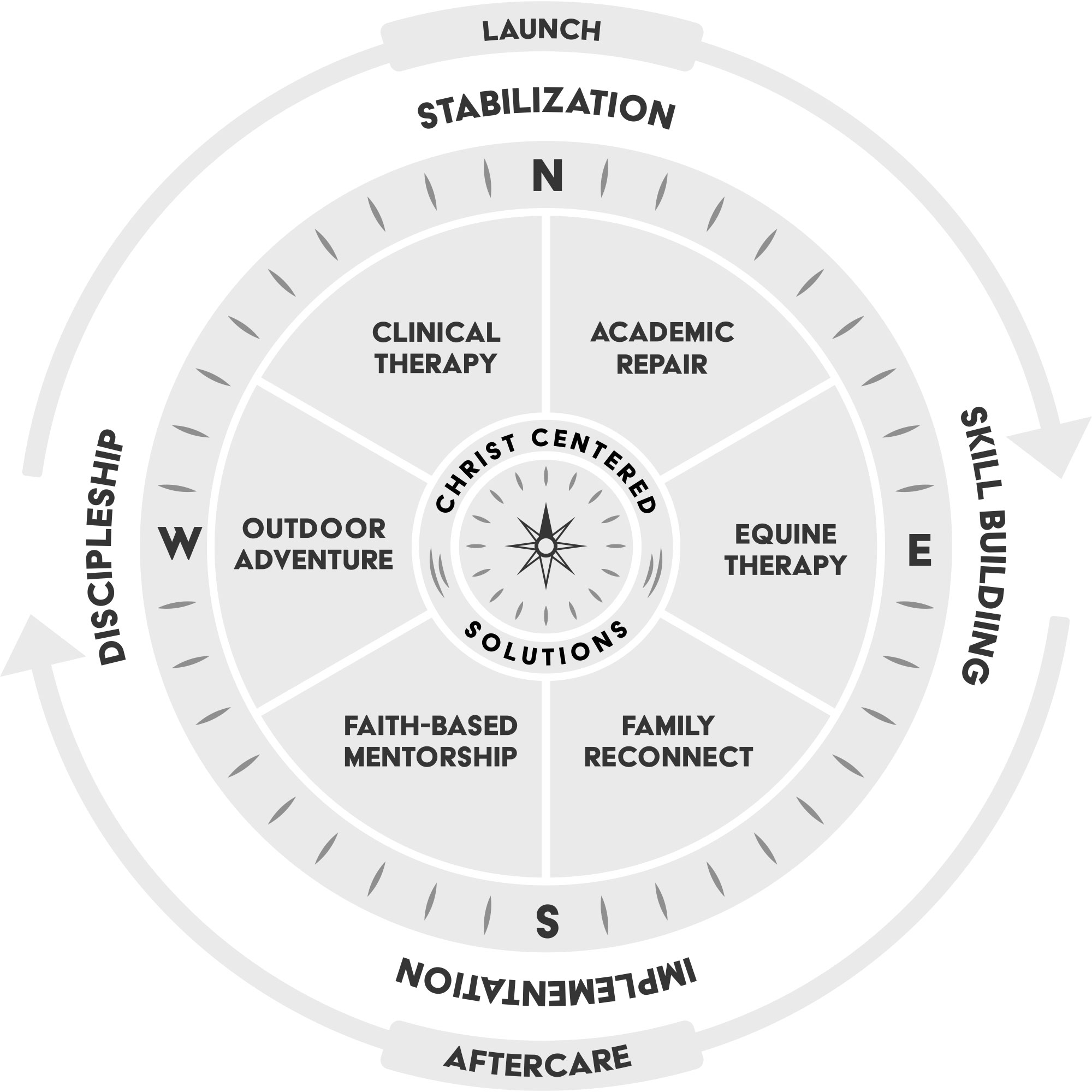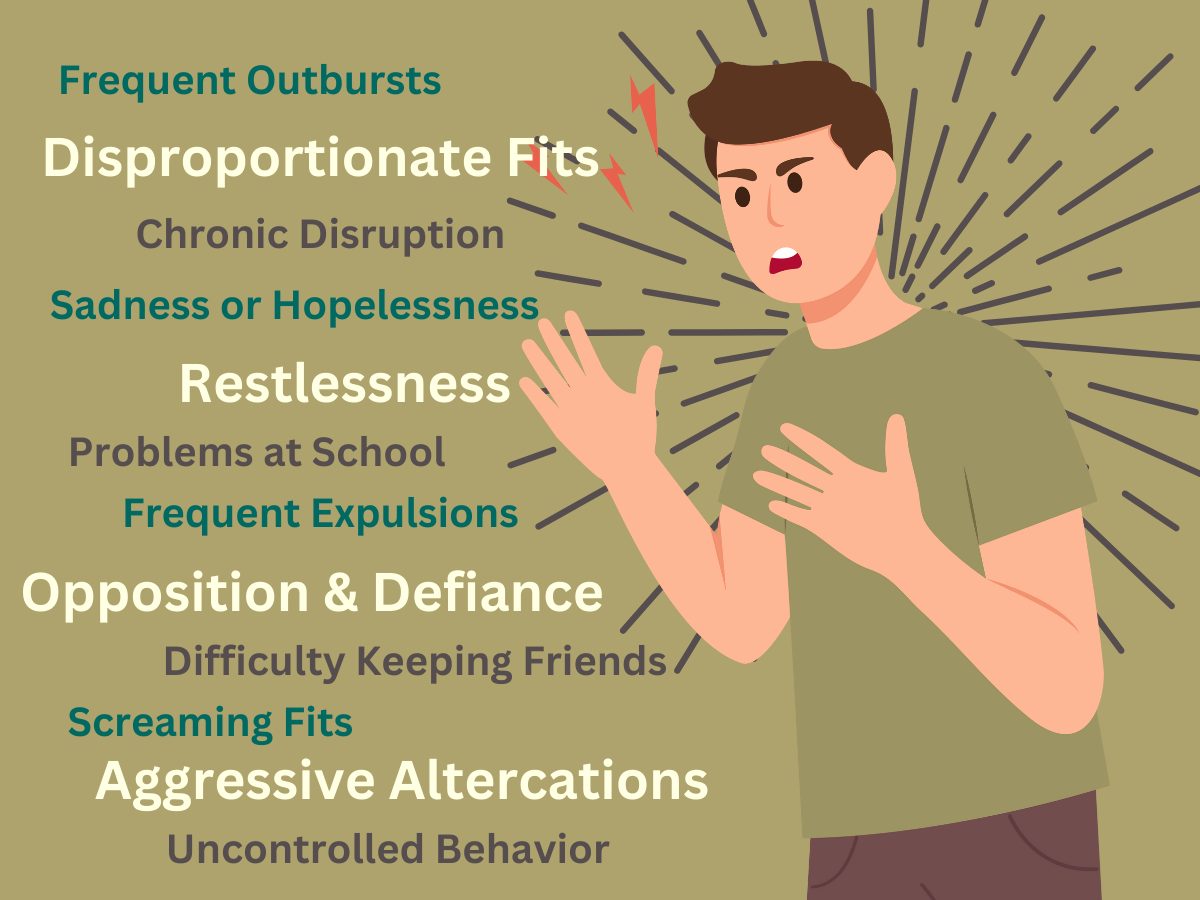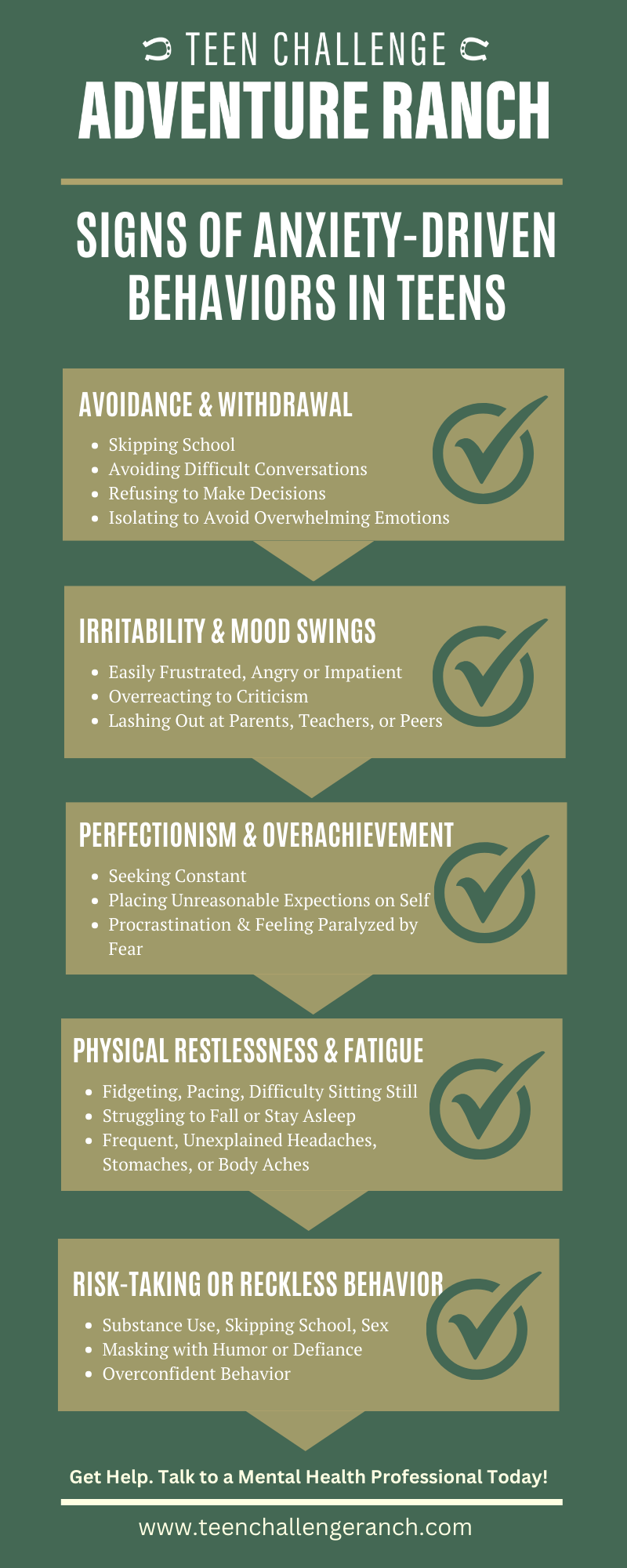Anxiety Disorder Treatment for Teens
Teen Challenge Adventure Ranch in Arkansas is a Christ-centered residential treatment facility for teen boys ages 14-17. Our dual-diagnosis treatment center helps boys struggling with anxiety-driven behaviors that disrupt daily functioning.
Anxiety-Driven Behaviors vs. Anxiety Disorders
Anxiety is a natural emotional and physical response to stress, uncertainty, or perceived danger. It’s part of our natural “fight-or-flight” response. While occassional anxiety is normal, severe or persistent anxiety can manifest as emotional or physical distress.
In teen boys, this might look like irritability or difficulty concentrating. It might also look like frequent upset stomachs or trouble sleeping. Anxiety-driven behaviors and the resulting physical or emotional effects are often part of more complex mental or behavioral health conditions.
When anxiety becomes overwhelming, persistent, and disrupts normal activities, it may indicate an anxiety disorder, which often requires professional support and treatment.
We can provide a safe, therapy-intensive intervention designed to stabilize behavior, treat underlying conditions and equip teens for success.
Individual, Family, and Group Therapy Sessions Led by Licensed, Christian Therapists
Psychiatric Evaluation, Medication Management & 24-Hour Skilled Nursing
Individualized Academics with Support for Behavior-Driven Learning Needs
Immersive, Christ-Centered Environment Fostering Personal & Spiritual Growth
Understanding How Anxiety Affects Behavior in Teens
Anxiety can significantly impact a teen boy’s behavior, often in ways that may not be immediately recognized as anxiety. Skipping school, avoiding difficult conversations, or refusing to make decisions are avoidant behaviors that are common when anxiety or sometimes the ‘fear of failure’ is an underlying cause.
Having frequent anger outbursts or easily becoming overwhelmed or agitated can be another way that anxiety influences behavior. Anxiety shows up in many different ways. For some, it’s perfectionism – and for others it’s restless fidgeting.
Avoidance & Withdrawal
It’s common for teens with severe anxiety to avoid places or things that cause anxiety. For some, a fear of failing at school might translate into frequently cutting class and chronic truancy.
In other cases, they may show up but appear chronically disengaged like refusing to do homework or participate in activities. Some may even refuse to make any or all decisions, constantly defaulting to those around them.
Irritability & Mood Swings
It’s common for teens with severe anxiety to avoid places or things that cause anxiety. For some, a fear of failing at school might translate into frequently cutting class and chronic truancy.
In other cases, they may show up but appear chronically disengaged like refusing to do homework or participate in activities. Some may even refuse to make any or all decisions, constantly defaulting to those around them.
Risk-Taking or Reckless Behavior
Substance abuse, even occassional, is a warning sign of a deeper disturbance. Mentally and emotionally healthy people do not seek out ways to alter their reality. For teens, expirementation with drugs can provide an escape from the negative feelings associated with anxiety.
Drugs are not the only outlet for teens struggling with anxiety. Other dependencies like excessive gaming, sexual behaviors, or an unhealthy attachment to another person or relationship can also be concerning, high-risk behaviors.
If you are concerned about your teen’s behavior, the first step is to consult a mental health professional. Through outpatient therapy, you can begin to explore underlying causes and gain a deeper understanding of how to help.
Effective Treatment Options for Anxiety-Driven Behaviors:
Cognitive Behavioral Therapy
Trauma-Focused Therapy
Family Therapy
Individualized Treatment Plans
Mindfulness-Based Therapies
Peer Support Groups
Behavioral Feedback
Positive Peer Interaction
Anger Management Training
When Is a Residential Treatment the Right Choice?
Residential treatment can provide structure, behavioral therapy, and continuous feedback that helps teens with anxiety-driven behaviors develop appropriate social skills for future success. Placement can be particularly effective when behaviors are severly impacting daily functioning or previous treatment options have failed.
Are behaviors severely impacting daily life?
When incidents begin to severely impact social, academic, or occupational functioning, treatment can help. The process typically begins with outpatient therapy, but if behaviors do not improve, residential treatment can provide a more immersive treatment experience.
Does the teen have more than one co-occurring diagnosis?
When more than one diagnosis is co-occuring, treatment becomes increasingly complex. These individuals often benefit from an immersive, residential treatment program that can tailor services to meet their unique needs. For example, if impulsive behaviors stem from past childhood trauma, a residential placement can support both root-cause interventions and the development of healthier coping strategies to stabilize behaviors.
Have outpatient treatment options previously failed?
For many, outpatient therapy provides enough support to overcome self-harming behaviors. However, if a teens who have previously failed with outpatient services or who have had multiple short-term placements, often benefit from longer-term treatment like a residential program.
Is there an immediate risk of danger?
If behaviors pose an immediate risk to the individual or those around them, placement in a residential treatment program can help keep everyone safe.
Have Previous Treatment Options Failed?
Residential treatment is often most appropriate for individuals who have not seen sustained success with outpatient or short-term treatment options. The immersive, long-term approach of a residential treatment center can provide enhanced structure and support to facilitate an intense focus on recovery.
Why Choose Teen Challenge Adventure Ranch?
We provide holistic therapeutic interventions designed to stabilize behaviors, engage teens in therapeutic treatment, address root cause mental health issues, and build decisions-making and academic skills for long-term success.
Our behavioral health treatment program focuses on stabilizing teens with proper medication management based on individual genetics and equipping them with life skills for long-term success.
Our six core areas of healing include:
- Clinical Therapy
- Individualized Academics
- Outdoor Adventure
- Equine Therapy
- Family Involvement
- Spiritual Growth






